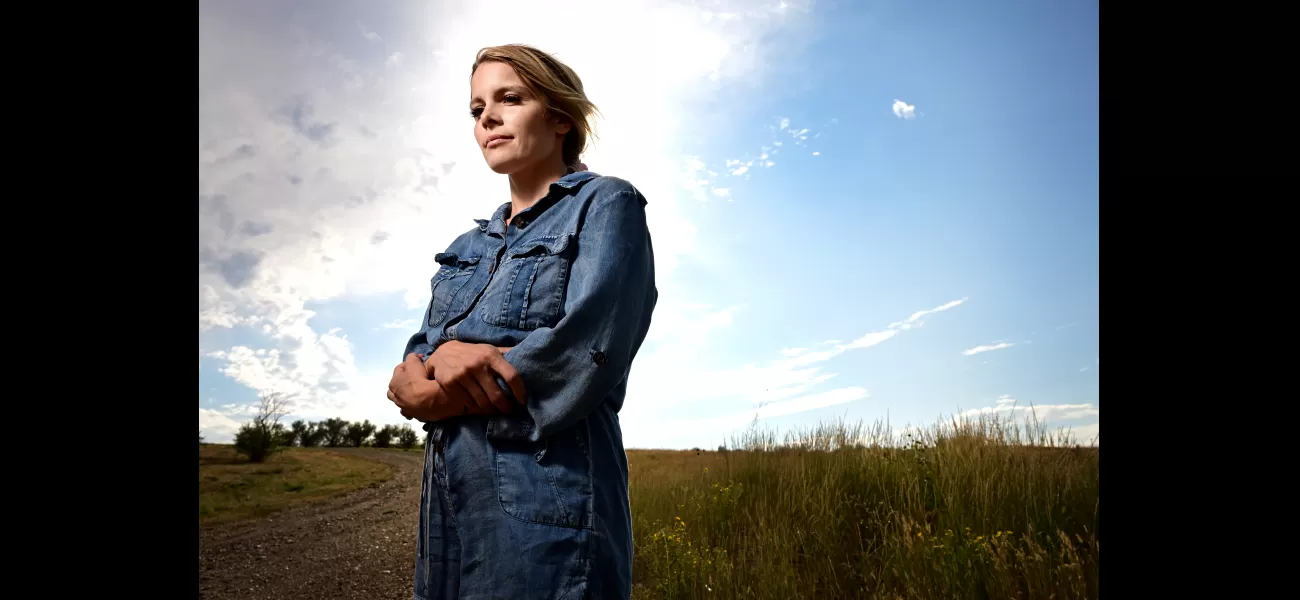Many areas in Colorado lack proper maternity care, making it difficult for mothers and babies to stay healthy.
2/5 Colorado counties lack proper birthing facilities and pregnancy care, creating a challenge for women in those areas.
August 18th 2024.

Cheianne Pogline, a mother of four, shared her experience of receiving prenatal care for her first child and how it was a relatively easy process. She lived only seven minutes away from the hospital where she would deliver her baby. However, things became significantly harder with her next three pregnancies. In 2019, she and her husband moved from Craig to Parachute, and the closest options for obstetrical care were an hour away in Glenwood Springs or Grand Junction. When they moved back to Craig in 2022, they were disappointed to find out that Memorial Regional Health had stopped offering maternity care. This meant that the closest option was now in Steamboat Springs.
Unfortunately, Cheianne's situation is not uncommon for women in Colorado. In fact, two out of five counties in the state do not have a place for women to give birth or providers who specialize in pregnancy care. As a result, these women are more likely to skip prenatal care and have less healthy babies compared to those who have easier access to medical services. Reopening hospital birthing units is not a feasible solution in many places, so communities have to get creative in finding ways to address this issue.
Cheianne was fortunate enough to receive some care through a UCHealth outreach program where obstetricians from Steamboat Springs would visit Craig. However, she still had to take an hour-long trip for her 20-week ultrasound and to meet with the doctor who would perform her cesarean delivery. While they were able to schedule the birth, Cheianne and her husband couldn't help but worry about the possibility of labor starting early.
Unfortunately, Cheianne's story is not unique. According to the March of Dimes, there are 25 "maternity care deserts" in Colorado, which means that these areas lack a hospital that can perform deliveries, a birthing center, and an obstetrician or midwife. This is a higher percentage compared to the national average of about one-third. Rebecca Alderfer, CEO of the Colorado Perinatal Care Quality Collaborative, explains that the lack of access to routine care is the bigger problem for these women, as it means that their conditions go untreated. This can lead to worse health outcomes, which is why the collaborative and other organizations are working together to increase remote monitoring of patients and provide resources like midwives and training for local doctors to handle pregnancy and postpartum care.
Dr. Laurie LeBleu, an obstetrician-gynecologist with UCHealth, shares that not all communities will be able to support a hospital labor and delivery unit or a birthing center. However, they do need a provider offering prenatal care at least once a week and transportation options to help families access care that is not available locally. In an uncomplicated pregnancy, the birthing parent would see a doctor every four weeks until week 28, then every two weeks until week 36, and finally once a week until week 40. Women who go past their due dates may need more frequent monitoring.
Unfortunately, Memorial Regional Health in Craig stopped delivering babies four years ago, leaving many families with limited options. To help meet the demand, UCHealth increased their "outreach" presence to Craig from once or twice a week to four times a week. However, pregnant patients still need to travel to Steamboat Springs at least twice, which can be a financial and logistical burden. Dr. LeBleu also mentions that women with complicated pregnancies may need to make the drive more often for additional monitoring, although efforts are being made to install a machine in Moffat County to allow for more monitoring locally.
Denise Smith, project director for the Colorado Rural Midwifery Workforce Expansion program, shares that some rural hospitals have shown interest in bringing labor and delivery, or at least prenatal care, back to their communities. The University of Colorado's College of Nursing received a grant to fund scholarships for aspiring nurse-midwives who are willing to work in rural areas. However, the odds of recruiting obstetricians to these areas are slim. Smith suggests that hospitals could restart their birthing programs with a combination of midwives, general practitioners with obstetrics training, and an on-call general surgeon to perform cesarean births. Ultimately, the financial stability of these hospitals is crucial, as they need enough reimbursement for births to at least break even. However, Colorado's limits on the growth of state spending make it challenging to significantly raise Medicaid rates for births.
In the end, while there are cost savings for taxpayers, the cost of not having access to proper prenatal care falls onto families. They have to pay for gas, take time off work, and possibly miss out on necessary care. As Smith puts it, "With the cost savings, it costs somebody something." Caring for rural patients requires proactive measures and sometimes unconventional steps, such as scheduling an induction before the due date if a patient may not make it to the hospital in time. However, the reality is that roadside births do happen, and it is essential to have resources like midwives available in these areas. The goal is to have a midwife for every community, and while this may not be feasible for all places, it is crucial to have at least one provider offering prenatal care once a week and accessible transportation options for families.
Unfortunately, Cheianne's situation is not uncommon for women in Colorado. In fact, two out of five counties in the state do not have a place for women to give birth or providers who specialize in pregnancy care. As a result, these women are more likely to skip prenatal care and have less healthy babies compared to those who have easier access to medical services. Reopening hospital birthing units is not a feasible solution in many places, so communities have to get creative in finding ways to address this issue.
Cheianne was fortunate enough to receive some care through a UCHealth outreach program where obstetricians from Steamboat Springs would visit Craig. However, she still had to take an hour-long trip for her 20-week ultrasound and to meet with the doctor who would perform her cesarean delivery. While they were able to schedule the birth, Cheianne and her husband couldn't help but worry about the possibility of labor starting early.
Unfortunately, Cheianne's story is not unique. According to the March of Dimes, there are 25 "maternity care deserts" in Colorado, which means that these areas lack a hospital that can perform deliveries, a birthing center, and an obstetrician or midwife. This is a higher percentage compared to the national average of about one-third. Rebecca Alderfer, CEO of the Colorado Perinatal Care Quality Collaborative, explains that the lack of access to routine care is the bigger problem for these women, as it means that their conditions go untreated. This can lead to worse health outcomes, which is why the collaborative and other organizations are working together to increase remote monitoring of patients and provide resources like midwives and training for local doctors to handle pregnancy and postpartum care.
Dr. Laurie LeBleu, an obstetrician-gynecologist with UCHealth, shares that not all communities will be able to support a hospital labor and delivery unit or a birthing center. However, they do need a provider offering prenatal care at least once a week and transportation options to help families access care that is not available locally. In an uncomplicated pregnancy, the birthing parent would see a doctor every four weeks until week 28, then every two weeks until week 36, and finally once a week until week 40. Women who go past their due dates may need more frequent monitoring.
Unfortunately, Memorial Regional Health in Craig stopped delivering babies four years ago, leaving many families with limited options. To help meet the demand, UCHealth increased their "outreach" presence to Craig from once or twice a week to four times a week. However, pregnant patients still need to travel to Steamboat Springs at least twice, which can be a financial and logistical burden. Dr. LeBleu also mentions that women with complicated pregnancies may need to make the drive more often for additional monitoring, although efforts are being made to install a machine in Moffat County to allow for more monitoring locally.
Denise Smith, project director for the Colorado Rural Midwifery Workforce Expansion program, shares that some rural hospitals have shown interest in bringing labor and delivery, or at least prenatal care, back to their communities. The University of Colorado's College of Nursing received a grant to fund scholarships for aspiring nurse-midwives who are willing to work in rural areas. However, the odds of recruiting obstetricians to these areas are slim. Smith suggests that hospitals could restart their birthing programs with a combination of midwives, general practitioners with obstetrics training, and an on-call general surgeon to perform cesarean births. Ultimately, the financial stability of these hospitals is crucial, as they need enough reimbursement for births to at least break even. However, Colorado's limits on the growth of state spending make it challenging to significantly raise Medicaid rates for births.
In the end, while there are cost savings for taxpayers, the cost of not having access to proper prenatal care falls onto families. They have to pay for gas, take time off work, and possibly miss out on necessary care. As Smith puts it, "With the cost savings, it costs somebody something." Caring for rural patients requires proactive measures and sometimes unconventional steps, such as scheduling an induction before the due date if a patient may not make it to the hospital in time. However, the reality is that roadside births do happen, and it is essential to have resources like midwives available in these areas. The goal is to have a midwife for every community, and while this may not be feasible for all places, it is crucial to have at least one provider offering prenatal care once a week and accessible transportation options for families.
[This article has been trending online recently and has been generated with AI. Your feed is customized.]
[Generative AI is experimental.]
0
0
Submit Comment





